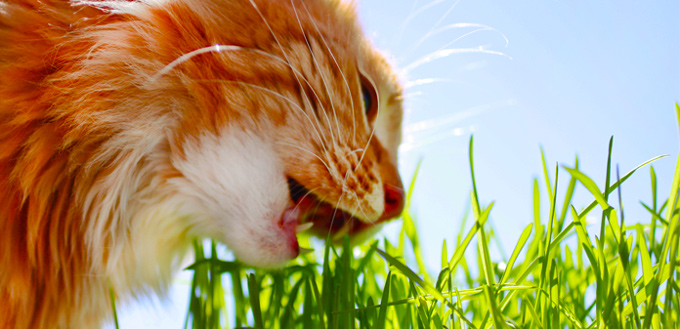We’ve all seen our beloved kitties munching on grass as they wander around our gardens and we may wonder why our well-fed happy pets engage in this behaviour. Some people believe that cats have acquired a taste for grass through their evolutionary journey because they eat lots of herbivore prey.
You’ll be pleased to know that it’s not just a random thing, it’s not unusual, and while there’s little nutritional value (especially given the number of grass cats can actually eat and keep down), there are many health benefits of grass for cats.

Grass Is Good Because:
- Nutrients – there are trace elements of vitamins A and D in the grass, as well a folic acid. This vitamin supports growth and can also increase oxygen levels in the blood, making it a good addition to your cat’s diet. Grass also contains chlorophyll which is an old remedy for pain, infection, ulcers, skin diseases and anemia, so is useful, particularly after catching and eating prey.
- Broad-leafed grass – has a laxative effect and is especially useful for maintaining bowel movement, ensuring that fur and other waste matter is expelled for your cat’s system.
- Narrow-leafed grass settles your cat’s stomach if he’s feeling a bit queasy.
- It makes cats vomit – cats don’t have the enzymes to digest large amounts of vegetable matter like grass, but they can regulate how much they eat so that they eat ‘just enough’ to make themselves sick. Vomiting allows cats to purge fur, bones, feathers, parasites and anything else that might be irritating their digestive tract or that might cause on-going illness from their systems.
- As all cats – wild and domestic – seem to eat grass, and as there is a little nutritional benefit, particularly as cats are not really designed to eat it, it is likely that they actually quite enjoy the taste of a bit of grass. If they don’t have access to grass, they can be found nibbling house plants, fabric, wires, anything really, which could cause serious problems both for the cat and for your stress levels. Take some time to investigate the sort of indoor and outdoor plants that are poisonous to cats so that you can avoid having them in your house and garden and encourage your cat to eat grass.
- You can hunt it – Oh yes, have you noticed your cat transfixed by blades of grass blowing in the breeze? Does he jump at those wavy blades and bat them and then chomp them? He’s having a bit of fun, and if it doesn’t do him any harm, then why not?
Always have grass available for your cat, whether he loves indoors or out, you do not have to buy special cat grass, just have a pot of ordinary grass that is reserved just for your cat.
Make Sure the Grass Is Clean
Be careful of treating grass with chemicals to make it grow better or to improve its quality, etc as this will make it potentially poisonous to your cat. Always make sure that there are pots of grass or areas of untreated grass that you encourage your cat to chomp on.
To Grow Grass
-
- Put some potting compost into a pot
- Sprinkle with grass seed
- water
- Cover with a plastic bag and put in a warm sunny place
- Keep covered until the grass begins to sprout and then uncover
- Let the grass grow to a couple of inches long before offering to your cat
- Once it has been nibbled down leave it on the sunny window and water it again until it grows long (if you offer it to your cat when it’s too short they might end up tearing it out by the roots and there will be nothing to grow back).
When to Be Concerned?
- If you notice your cat nibbling on a lot of things with no nutritional value (fabric, wires, paper, etc), he may have some dental problems, he could be bored, or he may have some other medical or psychological disorder.
- If your cat seems to be eating unusually large amounts of grass or eating grass every day and vomiting a lot
- If you believe your cat has eaten grass that is contaminated with chemicals or has eaten another plant that is potentially poisonous to him.
In all of these cases consult your vet at the earliest opportunity to eliminate or address medical or other conditions that could be detrimental to your cat’s health.
Related Post: Why Does My Cat Eat Plastic?
Sources:
- John Perritano, Why Do Dogs (and Cats) Eat Grass?, HowStuffWorks
- Why Do Cats Eat Grass?, PetMD
- Dr. Wailani Sung MS, PHD, DVM, DACVB, Why Does My Cat… Eat Grass or Houseplants?, VetStreet







